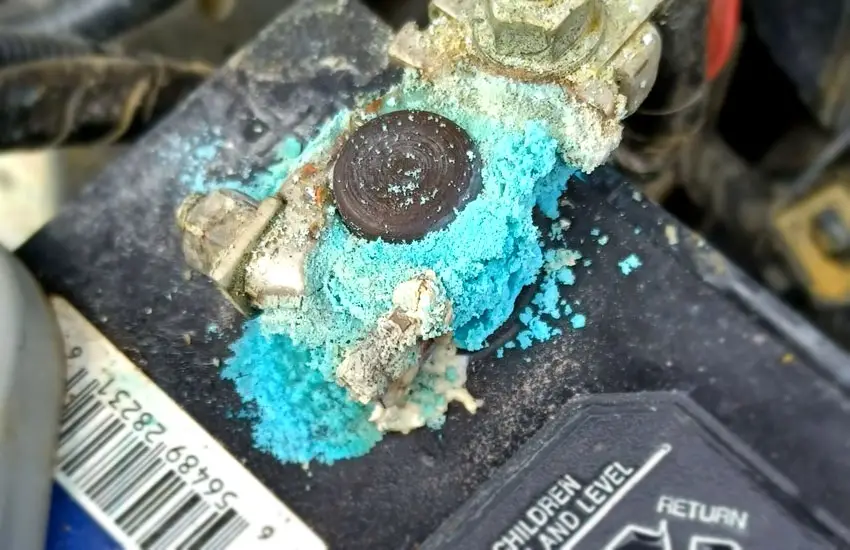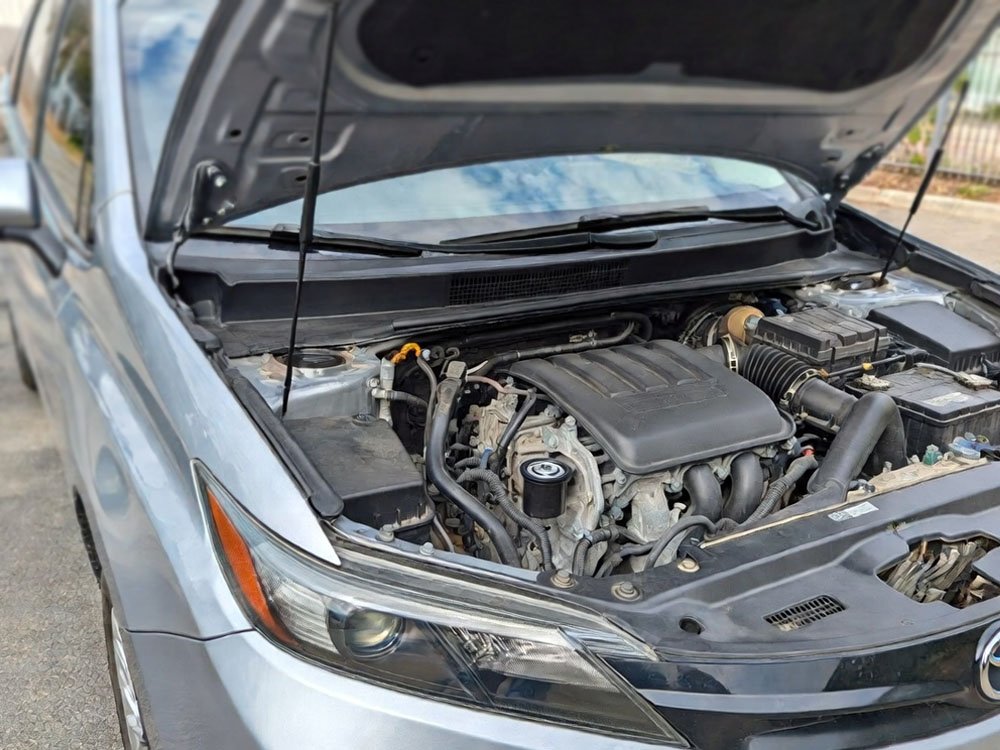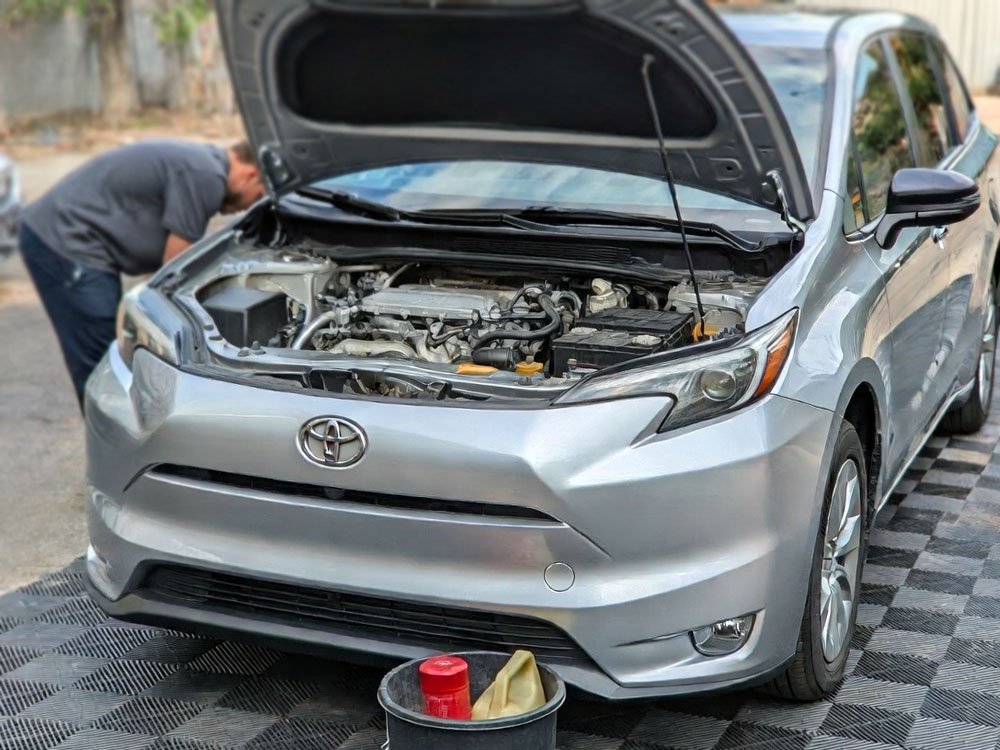As an Amazon Associate, I earn from qualifying purchases at no extra cost to you.
Blue Stuff On Car Battery: How to Remove and Prevent Corrosion
You might have noticed some blue stuff on your car battery, and it's not just a weird decoration. That blue stuff is actually corrosion, and it can cause problems for your battery and car. If you leave it there, it might lead to starting issues or even damage your battery. Don't worry, though! In this blog post, we'll show you how to remove that blue corrosion easily and share tips to prevent it from coming back. Keeping your battery clean is super important for a healthy car!
Identifying the Blue Stuff on Car Batteries
When you look at your car battery, you might notice some strange blue stuff on it. This blue stuff is called corrosion. It can look like a blue powder or crusty bits on the battery terminals or around the battery case. Understanding what this blue stuff is and why it appears is important for keeping your car healthy.
What Causes the Blue Stuff?
The blue stuff usually comes from a chemical reaction between the battery and the air or moisture. When the battery is charging or discharging, it can release gas. This gas can react with the metal parts of the battery, causing a blue or greenish deposit to form. This is especially common in batteries that have liquid inside them. The blue corrosion can also occur if the battery is old or has a leak. It is important to check your battery regularly for any signs of this blue corrosion.
Signs of Corrosion
You can spot corrosion by looking closely at your battery. If you see any blue, green, or white powdery substance on the battery terminals, that is likely corrosion. You may also notice that the battery cables feel loose or are not connected tightly. In some cases, the battery may not work well or start your car because of the corrosion. If you see any of these signs, it is time to clean the battery and check for any other problems.
Why You Should Care
Identifying and dealing with the blue stuff on your car battery is important. If you leave it alone, it can cause bigger problems. The corrosion can make it hard for the battery to work properly, leading to issues starting your car. By checking for corrosion often and cleaning it up, you can help your battery last longer and keep your car running smoothly. Regular care can save you money and prevent more serious problems down the road.

How to Remove Corrosion from Car Batteries
Removing corrosion from your car battery is an easy task you can do at home. With the right tools and safety precautions, you can clean your battery and help it last longer.
What You Need
Before you start, gather a few items:
- A cloth or paper towel for drying
- Safety gloves and goggles to protect your hands and eyes
- A wrench to remove battery cables
- A wire brush or an old toothbrush for scrubbing
- Baking soda and water mixture (1 tablespoon of baking soda mixed with 1 cup of water)
Step 1: Turn Off the Car
Start by making sure your car is turned off. You don't want any electrical issues while you are working. Park your car in a safe place, like your garage or driveway, where you can easily access the battery. It is also a good idea to turn off any lights or devices inside the car to avoid draining the battery further while you work.
Step 2: Wear Safety Gear
Next, put on your safety gloves and goggles. This will protect your hands from the chemicals in the battery and keep your eyes safe from any dust or splashes. Always take these safety steps seriously. Even a small amount of battery acid can cause irritation, so it's best to be cautious. Wearing safety gear helps ensure you can clean the battery without any worries.
Step 3: Disconnect the Battery Cables
Now it's time to remove the battery cables. Using your wrench, carefully loosen the bolt on the negative (-) cable first. This is important because it helps prevent sparks. Once the negative cable is loose, gently pull it off and set it aside. After that, do the same for the positive (+) cable. Make sure both cables are completely removed from the battery before you start cleaning. Keeping the cables away from the battery ensures you will not accidentally create a short circuit.
Step 4: Check for Corrosion
After you disconnect the cables, take a good look at the battery terminals. You might see a blue or green powdery substance around the terminals. This is the corrosion we want to clean. Corrosion can make it hard for the battery to work properly, so it's important to take care of it right away. If you see any corrosion, don't worry! It is common and can be easily removed with the right steps.
Step 5: Apply the Baking Soda Mixture
Now, dip your wire brush or toothbrush into the baking soda mixture you prepared earlier. Scrub the corroded areas gently with the brush. The baking soda will react with the acid and help lift off the corrosion. Make sure to scrub all the parts that look crusty. This will take a little time, but it's important to do it well. Be thorough and gentle, so you do not damage any of the battery components.
Step 6: Rinse with Water
After scrubbing, use a cloth or paper towel to wipe away the leftover baking soda mixture. If there is still some stubborn corrosion, you can use a little water to rinse the area. However, be careful not to get any water into the battery cells. If you do, it could cause problems later. Use just enough water to help remove any remaining residue but avoid soaking the battery.
Step 7: Dry the Battery
Once you have rinsed and wiped everything clean, take a dry cloth and make sure the battery is completely dry. This step is important because any leftover moisture can lead to more corrosion in the future. A dry battery will work better and last longer. Make sure you pay attention to all areas of the battery, including the terminals and any hard-to-reach spots.
Step 8: Reconnect the Cables
Now it's time to put everything back together. Start by reconnecting the positive (+) cable first. Slide it onto the battery terminal and use your wrench to tighten the bolt. After that, reconnect the negative (-) cable in the same way. Make sure both cables are secured tightly so they won't come loose while you drive. This will ensure a good connection and keep the battery working properly.
Step 9: Final Check
Finally, look over your battery to ensure everything is clean and secure. Check that the cables are connected properly and there is no leftover corrosion. This will help your battery work well and prevent any issues in the future. A quick visual check can save you from problems down the road. If everything looks good, you are all done!
Cleaning corrosion from your car battery is easy and important for your vehicle’s health. By following these steps regularly, you can keep your battery in good shape and prevent future problems. With a little care, your battery can last longer and help your car run smoothly.
Preventing Future Corrosion on Car Batteries
Taking care of your car battery is essential to keep it working well and to avoid corrosion. By following a few simple steps, you can help prevent corrosion from happening in the first place. Here are some easy ways to protect your battery.
Regular Battery Checks
One of the best ways to prevent corrosion is to check your battery regularly. Look for any signs of dirt, moisture, or corrosion around the battery terminals. If you see any buildup, clean it off right away using the steps we discussed earlier. Regular checks allow you to catch small problems before they become bigger issues. Make it a habit to inspect your battery every few months, especially before winter when batteries can be more vulnerable to issues.
Keep the Battery Clean
Keeping your battery clean is very important. Dirt and grime can trap moisture, which leads to corrosion. To keep your battery clean, use a damp cloth to wipe off any dirt. Make sure to avoid any metal parts or the battery terminals when cleaning. By keeping the battery case and terminals clean, you reduce the chance of corrosion forming.
Apply Anti-Corrosion Products
There are special anti-corrosion products that you can use to protect your battery. You can find sprays or pads designed specifically for car batteries. These products create a barrier that helps prevent moisture and dirt from getting to the terminals. If you use a spray, make sure to apply it according to the instructions. If you use pads, place them on the battery terminals after cleaning. This extra layer of protection can go a long way in preventing corrosion.
Ensure Proper Connections
Another important step is to make sure the battery cables are connected tightly. Loose cables can create a poor connection, leading to electrical issues and heat buildup, which can cause corrosion. After cleaning your battery, always check that the positive and negative cables are snug and secure. If you notice any frayed wires or damaged cables, it's a good idea to replace them to ensure a solid connection.
Avoid Overcharging the Battery
Overcharging can cause battery acid to leak, leading to corrosion. Make sure your car’s charging system is working properly and not overcharging the battery. If you use a battery charger, follow the manufacturer's instructions and avoid leaving it on for too long. By ensuring the battery is charged correctly, you can prevent leaks and the corrosion that comes with them.
Store the Battery Properly
If you ever need to store your battery, make sure to do it in a cool, dry place. Extreme temperatures can affect battery performance and lead to corrosion. If you store the battery for a long time, consider placing it on a battery maintainer to keep it charged without overcharging. Also, cover the battery terminals with a plastic cover or tape to keep dust and moisture away.
Preventing future corrosion on your car battery is easy if you take a few simple steps. By regularly checking your battery, keeping it clean, and using protective products, you can extend the life of your battery and ensure it works well. A little care goes a long way in preventing corrosion and keeping your car running smoothly.
Are these Questions in Your Mind?
Is it normal for car batteries to have corrosion?
Yes, it is normal for car batteries to develop some corrosion over time. Factors like age, humidity, and battery type can all contribute to this issue.
Can I use vinegar to clean battery corrosion?
Yes, vinegar can be used to clean battery corrosion due to its acidity. However, baking soda is usually a safer and more effective option for neutralizing battery acid.
Do I need to disconnect the battery to clean it?
Yes, it is recommended to disconnect the battery before cleaning it. This prevents any electrical shorts and ensures your safety while you work.
Is it safe to clean battery terminals with water?
Yes, it is safe to use a small amount of water to rinse off the battery terminals after cleaning. Just be careful not to get water inside the battery cells.
Can I prevent battery corrosion with regular maintenance?
Yes, regular maintenance, such as cleaning and checking connections, can significantly reduce the risk of battery corrosion.
Do I have to replace a corroded battery?
Not necessarily. If the corrosion is cleaned off and the battery is still functioning well, it does not need to be replaced. However, if the corrosion is severe or the battery is old, replacement may be necessary.
Is it okay to use a wire brush on battery terminals?
Yes, using a wire brush can be effective for removing corrosion, but be gentle to avoid damaging the terminals.
Can I store my car battery outside?
No, it is not recommended to store your car battery outside, especially in extreme temperatures. A cool, dry place indoors is best for battery storage.
Do I need special tools to clean battery corrosion?
No, you don't need special tools to clean battery corrosion. Common household items like a toothbrush, baking soda, and water can do the job.
Is it possible for corrosion to cause my car not to start?
Yes, corrosion on battery terminals can create poor connections, which may prevent your car from starting. Cleaning the corrosion can help restore the connection.
I hope this article helps you understand how to deal with the blue stuff on your car battery. Remember, cleaning corrosion is important for your battery’s health. By regularly checking and cleaning your battery, you can keep it in good shape and help your car run smoothly. A little care goes a long way in preventing future problems.











